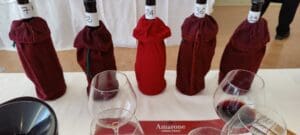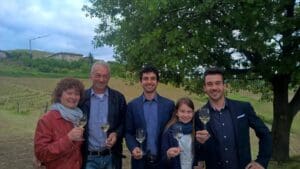In the February issue of the Mensa Singapore newsletter, Menews, I was featured as one of the funky Mensans. Since the newsletter is catered for members only, I sought the green light from the writer for republishing the content. Generally this reflects the typical questions I received with regards to my wine interest, so here goes!
“Dance and sing, we are eternal; Let us still be mad with drinking: ‘Tis a madness less infernal than the madness caused by thinking.” If we believe the Scottish poet John Davidson, wine and Mensans ought to go together really well – at least, wine has gone down really well with Chan Wai Xin, who took his love for wine several steps further and is now a certified wine specialist. What’s with his hobby? Fellow Mensa member Janette Lowe finds out in this interview.
How did you start wine tasting?
In 2011 I was seeking that elusive little thing called “work-life balance”. Back then my employment package included a personal development benefit which covered courses like language, music and etc. The “et cetera” was crucial since no one ever associated wine with personal development, but the claim form went through nonetheless.
I registered and completed an evening programme in Singapore Polytechnic. One year later I joined the US-based Society of Wine Educators, and I am now a Certified Specialist of Wine (CSW).
What do you enjoy most about learning about wines and the processes that involves the coming about of the final product?
For most people, wine is simply an alcoholic beverage. They are half right. But wine can be viewed as an artistic work of modern-day alchemy. Sugar from grape juice, choice of yeast, fermentation methods, barrel selection, ageing process, bottling facility. Every stage of the manufacturing plays a part towards the final taste, smell, texture and pricing.
Wait a minute, wine study involves more than the above-mentioned! Geographical influence, soil types, climatic influence, historical background, current legislation, consumer behaviour and thesis on predicting future trends. Using school subjects as analogy, wine study encompasses mathematics, plant biology, history, literature, languages, economics and social sciences. Enough subjects for a GCE examination!
The more we know the more we want to know. Feeding our curiosity is the enjoyment for wine students, and it kills the cat.
What does it take to be a good wine taster?
What’s a good wine taster? Great nose and palate? Perhaps. But more importantly a good imagination, extensive aroma dictionary, vocal attitude and open mind. A common tasting note of South Australia Shiraz can be plummy, black berries and hints of white pepper. What it meant was the smell suggested certain fruits and spices, which is possible if the taster had come across the smell. Don’t worry, no additional fruits and spices were harmed in the making of wines.
Most importantly no one is absolutely right about tasting note. Aroma dictionary and recognition thresholds are very personal. But with an open mind and vocal, one can hear and be heard of what others have tasted. Share, learn and be learned.
What would you recommend that those who are starting out do when they start their first wine tasting?
So you want to find out more about wines? Drink cheap wines. They have the most direct expression of fruits characteristic that can help consumers sort out their preferences. Be it red, white, light or heavy, the cheap wines cater to almost everything. Even if you don’t like it, you won’t feel as bad for your wallet.
Be united but diversified. Organise group drinking sessions where everyone can pool in a different bottle to compare and contrast each wines, something that I still do with different drinking groups. On social media, there are various non trade informal group dedicated to bridge the gap between the industry and consumers. Spice In Wine, EnjoyWine.Sg and Wine Xin The Blabber are among some of them. Don’t be shy, talk to us.
Article was first published in 2013 February issue of Menews, the official newsletter of Mensa Singapore.



